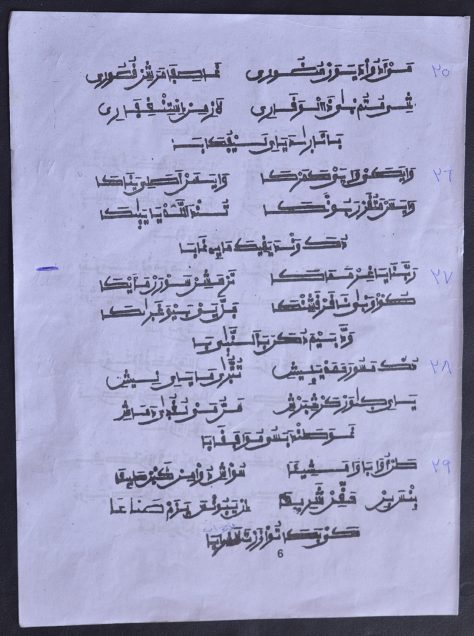The Glorious (Majidu): Infiraji 1
Quick Jump: Manuscript || Transcription/Translations || Multimedia
| Title | The Glorious (Majidu): Infiraji 1 |
| Author or Owner | Alhaji Malam Aliyu Namangi (author), Ibrahim Yaqubu Gusau (scribe/copyist) |
| Subject | Praise Poem, Virtues of Prophet Muhammad, the Night Journey |
| Content | Majidu (The Glorious), is an attribute of Allah and the poet begins the first set of stanzas in the name of this attribute. He then proceeds to lay out the aim of the poem, which is to “applaud the Prophet of erudition, Muhammad.” The poet goes on to commend the Prophet’s exemplary virtues: beloved, clement, forgiving, intelligent, and respectful. The stanzas describe the Prophet as handsome, with unparalleled features inside and out, but even more beautiful from the inside. It enjoins all to carefully listen to the Prophet, obey him, and refrain from what he proscribed. Towards the end of the poem, the poet describes how the Prophet embarked on the Night Journey to meet his Creator and receive the five daily prayers. Being blind, Dr. Aliyu Namangi had dreamed of visiting the Prophet’s grave in Medina, so as to relieve the worries in his heart. He concludes by praising the Almighty God, Lord of the worlds.
Majidu is part of a larger collection entitled Infirāji (also written as Imfiraaji or Infiraji), which is a concept that means relief, comfort, consolation, happiness or salvation. This collection has nine poems composed by Alhaji Aliyu Namangi (1894-1990). Each poem discusses a particular subject. As with many Hausa poems, Infirāji incorporates Arabic words, phrases, and prayers. Dr. Namangi was a blind poet, preacher, and scholar who hailed from Zaria, Kaduna State, in Northern Nigeria. He was greatly influenced by his studies on asceticism, Sufism, eulogies, and general exhortations. He felt he had a duty to impart the knowledge he had acquired to others. He composed many poems, including Kanzil A’azam (The Greatest Treasure) and Tanbih al-Anām (A Reminder for Humankind); but Infirāji is certainly his magnum opus. Dr. Namangi’s Infirāji was originally written in Hausa Ajami, but later the Gaskiya Corporation of Zaria transcribed it into a nine-volume book written in Boko, or the Hausa Latin script. Because Dr. Aliyu Namangi was blind, scribes took on the task of writing it down as he did the composing and chanting of Infirāji. This has led to various versions, especially as Namangi himself would often update and make certain changes while chanting the poems. The version we are using here is the one written by Yaqubu Gusau. |
| Genre | Poetry |
| Language | Hausa |
| Script | Hausa Ajami |
| Manuscript condition | 16 pages (including cover and title page), reproduction of original mss. Alhaji Ahmad al-Tijani is the scribe as well as the distributor of the Ajami version. |
| Type | Market edition, distributed by Ahmad al-Tijani, with permission from the author, Malam Aliyu Namangi Zaria. Note that a Latin alphabet transcription of this mss. was also produced. It was distributed by Gaskiya Corporation of Zaria. |
| Publisher | Gaskiya Corporation, Zaria |
| Provenance | Zaria, Kaduna State, Nigeria |
| Source Reference | Kurfi, Mustapha and Ngom, Fallou. 2015. African Ajami Library: Digital Preservation of Hausa Ajami Manuscripts of Nigeria. Boston, Boston University Library: http://hdl.handle.net/2144/11724 |
| Access condition and copyright | These materials are subject to copyright and are distributed under the terms of the Creative Commons Attribution-Non-Commercial 4.0 License, which permits non-commercial use, distribution, and reproduction in any medium, provided the original author and source are credited. For use, distribution or reproduction beyond these terms, contact Professor Fallou Ngom (fngom@bu.edu). |
| Contributors | Fallou Ngom, Jennifer J. Yanco, Mustapha H. Kurfi, Garba Zakari, Rebecca Shereikis, Daivi Rodima-Taylor, Alison Parker, Frank Antonelli, Shawn Provencal, and Mark Lewis. |
| Required citation information | Fallou Ngom (PI), Jennifer Yanco, Mustapha Hashim Kurfi, Garba Zakari, Babacar Dieng, Daivi Rodima-Taylor, and Rebecca Shereikis. 2022. “The Glorious (Majidu).” https://sites.bu.edu/nehajami/the-four-languages/hausa/hausa-manuscripts/infiraji-1-majidu/ |
Manuscript
Image slideshow below. Click for larger image.
View or download a full-quality manuscript PDF here.
View or download a reduced file size manuscript PDF here.
Transcription and Translations
Click below to open or download the following resources:


















